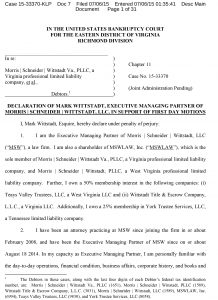The strange saga of an out-of-town law firm and an alleged $20 million embezzlement scam that entangled a well-known PGA golfer has wound its way to Richmond.
Morris Schneider Wittstadt, an Atlanta law firm that once handled lucrative volumes of real estate transactions around the Southeast, including a steady flow of foreclosures in the Richmond market through its Wittstadt Title & Escrow Co., filed Chapter 11 bankruptcy protection in search of breathing room from a heap of controversy.
The firm, which doesn’t have a major physical presence locally, put itself and several related entities into Chapter 11 on July 5 in the Richmond Division of the U.S. Bankruptcy Court.
The filings have led to several Richmond attorneys picking up work on the case from various angles. Jennifer McLemore and Margaret Yang of Christian & Barton are representing Morris Schneider and its other bankrupt entities. Chris Perkins of LeClairRyan is representing Amegy Bank, one of the creditors in the case.
And Bill Gray of Sands Anderson is local counsel for brothers Mark and Rod Wittstadt, Morris Schneider’s managing partners who claim that a massive embezzlement by a former partner ignited a devastating sequence of events that forced it into bankruptcy.
According to court filings, the Wittstadts joined the firm in 2008, when it was known as Morris Hardwick Schneider. The Wittstadts, along with then-partner and namesake Nathan Hardwick IV, were at the helm of a firm at its peak and had 30 offices in several states and 850 employees.
Then in 2014, according to a written declaration in the bankruptcy records from Mark Wittstadt, Hardwick informed his fellow partners of some “financial irregularities” related to the funds the firm held for third parties in various escrow accounts. Hardwick told them he received “over disbursements” of funds from those accounts, initially thought to be around $2 million, and that he intended to pay the money back.
Wittstadt said in the filing that audits eventually revealed a much larger shortfall, and the firm sued Hardwick, accusing him of embezzling more than $20 million from escrow accounts for his personal use, including “payments remitted directly to casinos and on account of private jets for the personal use of Mr. Hardwick, his girlfriend and family.”
Hardwick has denied the allegations, according to news reports and court records. He resigned from the firm in August 2014. The firm recently sued a Las Vegas casino over unauthorized transfers, according to a report from the Las Vegas Review-Journal.
MSW’s initial bankruptcy filings list 30 creditors owed a total of $18.19 million. Among the firm’s creditors is PGA golfer Dustin Johnson, who has a claim for $4 million on a loan that allegedly was borrowed by Hardwick under false pretenses in attempt to try to cover the firm’s shortfalls.
Johnson has since sued Hardwick and the firm, and the case is pending.
MSW has since been whittled down to 36 employees, court records show, in part due to a loss of revenue from a damaged reputation following press reports of the saga, particularly once Johnson got involved.
“The publicity surrounding Mr. Johnson’s lawsuit and the false statements made by his counsel alleging criminal conduct by the Wittstadts were too much for even an otherwise successful firm like MSW to bear,” according to the filing.
Those events, along with the potential legal damages, all led to the firm seeking shelter in Chapter 11 in Richmond. The firm put six entities in Chapter 11, including its Morris Schneider Wittstadt Va., PLLC, which was incorporated in Henrico County. It lists an address in Innsbrook at 4701 Cox Road, an office that serves as registered agent for various corporations.
Jeffrey Waxman, an attorney representing MSW, said that the Wittstadts chose to file in Richmond because it was one of the jurisdictions in which the firm had an incorporated affiliate. Others were in Georgia, West Virginia and Tennessee. Richmond is also close to Baltimore, where the Wittstadts mainly practice, allowing them to keep travel costs down during the bankruptcy proceedings.
They also saw another advantage: “The Bankruptcy Court for the Eastern District of Virginia has experience with some very large and sophisticated bankruptcy cases which, hopefully, will allow the debtors to move forward in the bankruptcy process as quickly as possible,” Waxman said in an email last week.
Initial hearings in the MSW bankruptcy were held in Richmond before Judge Keith Phillips on July 7. The next slate of hearings in the case is scheduled for July 31.
The strange saga of an out-of-town law firm and an alleged $20 million embezzlement scam that entangled a well-known PGA golfer has wound its way to Richmond.
Morris Schneider Wittstadt, an Atlanta law firm that once handled lucrative volumes of real estate transactions around the Southeast, including a steady flow of foreclosures in the Richmond market through its Wittstadt Title & Escrow Co., filed Chapter 11 bankruptcy protection in search of breathing room from a heap of controversy.
The firm, which doesn’t have a major physical presence locally, put itself and several related entities into Chapter 11 on July 5 in the Richmond Division of the U.S. Bankruptcy Court.
The filings have led to several Richmond attorneys picking up work on the case from various angles. Jennifer McLemore and Margaret Yang of Christian & Barton are representing Morris Schneider and its other bankrupt entities. Chris Perkins of LeClairRyan is representing Amegy Bank, one of the creditors in the case.
And Bill Gray of Sands Anderson is local counsel for brothers Mark and Rod Wittstadt, Morris Schneider’s managing partners who claim that a massive embezzlement by a former partner ignited a devastating sequence of events that forced it into bankruptcy.
According to court filings, the Wittstadts joined the firm in 2008, when it was known as Morris Hardwick Schneider. The Wittstadts, along with then-partner and namesake Nathan Hardwick IV, were at the helm of a firm at its peak and had 30 offices in several states and 850 employees.
Then in 2014, according to a written declaration in the bankruptcy records from Mark Wittstadt, Hardwick informed his fellow partners of some “financial irregularities” related to the funds the firm held for third parties in various escrow accounts. Hardwick told them he received “over disbursements” of funds from those accounts, initially thought to be around $2 million, and that he intended to pay the money back.
Wittstadt said in the filing that audits eventually revealed a much larger shortfall, and the firm sued Hardwick, accusing him of embezzling more than $20 million from escrow accounts for his personal use, including “payments remitted directly to casinos and on account of private jets for the personal use of Mr. Hardwick, his girlfriend and family.”
Hardwick has denied the allegations, according to news reports and court records. He resigned from the firm in August 2014. The firm recently sued a Las Vegas casino over unauthorized transfers, according to a report from the Las Vegas Review-Journal.
MSW’s initial bankruptcy filings list 30 creditors owed a total of $18.19 million. Among the firm’s creditors is PGA golfer Dustin Johnson, who has a claim for $4 million on a loan that allegedly was borrowed by Hardwick under false pretenses in attempt to try to cover the firm’s shortfalls.
Johnson has since sued Hardwick and the firm, and the case is pending.
MSW has since been whittled down to 36 employees, court records show, in part due to a loss of revenue from a damaged reputation following press reports of the saga, particularly once Johnson got involved.
“The publicity surrounding Mr. Johnson’s lawsuit and the false statements made by his counsel alleging criminal conduct by the Wittstadts were too much for even an otherwise successful firm like MSW to bear,” according to the filing.
Those events, along with the potential legal damages, all led to the firm seeking shelter in Chapter 11 in Richmond. The firm put six entities in Chapter 11, including its Morris Schneider Wittstadt Va., PLLC, which was incorporated in Henrico County. It lists an address in Innsbrook at 4701 Cox Road, an office that serves as registered agent for various corporations.
Jeffrey Waxman, an attorney representing MSW, said that the Wittstadts chose to file in Richmond because it was one of the jurisdictions in which the firm had an incorporated affiliate. Others were in Georgia, West Virginia and Tennessee. Richmond is also close to Baltimore, where the Wittstadts mainly practice, allowing them to keep travel costs down during the bankruptcy proceedings.
They also saw another advantage: “The Bankruptcy Court for the Eastern District of Virginia has experience with some very large and sophisticated bankruptcy cases which, hopefully, will allow the debtors to move forward in the bankruptcy process as quickly as possible,” Waxman said in an email last week.
Initial hearings in the MSW bankruptcy were held in Richmond before Judge Keith Phillips on July 7. The next slate of hearings in the case is scheduled for July 31.


Alarming details charged in the collapse of Butler & Hosch …
http://www.housingwire.com/…/34404-alleged-details-emerge-about-the-colla...
7 days ago – In the bankruptcy filing, Morris Schneider Wittstadt’s managing partner, … to B&H, which B&H surreptitiously used for the purposes of factoring through … Under the terms of the agreement, Amegy Bank would “purchase certain …